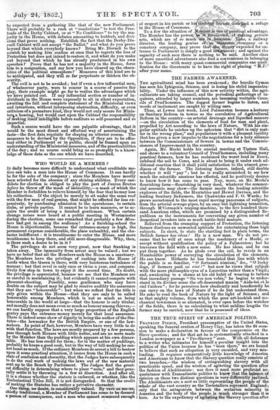THE FARMER AWAKENED.
THE agricultural mind has been awakened ; the bucolic Cymon has seen his Iphigenia, Science, and is losing his stolid impenetra- bility. Under the influence of this new activity within, the agri- culturists are taking council, and the periodical gatherings of in- quirers, attended by larger numbers, are becoming veritable Coun- cils of Prud'hommes. The dogged farmer begins to listen, and words of incitement are caught by willing ears.
Thus, at Lewes last week, Lord Palmerston became a lecturer on Sanitary Reform in towns as the correlative of Agricultural Reform in the country—on arterial drainage and liquefied manure —on the circulation of the elements of food for man and plant, propelled by Art according to the laws of Nature. With ins sin- gular aptitude he catches up the aphorism that "dirt is only mat- ter in the wrong place," and popularizes it with a pleasant lucidity that has given a new impulse to the negotiations for a holy alliance between the Commissioners of Sewers in towns and the Commis- sioners of Improvement in the country. Again, Mr. Mechi holds his annual meeting at Tiptree Hall, and shows to a volunteer Council of Prud'hommes, including many practical farmers, how he has reclaimed the worst land in Essex, subdued the soil to Ceres, and is about to bring it under such ad- ditional coaction that it shall yield satisfaction to the utmost gree- diness of the farmer. The listening farmer, indeed, still doubts whether it will " pay " ; but he is really astonished to see how much the scientific amateur has effected, and he positively desires to know how it has come to pass. Nay, more, on Mr. Mechi's flourishing farm—flourishing in very deed, whatever the commer- cial accounts may show—the farmer meets the leading scientific explorers of the fields, the Huxtables and Hewet Devises, and the leading Sanitary Reformers, the Chadwicks and F. 0. 'Wards ; he grows accustomed to the most rapid moving panorama of subjects, from the arterial sewage-pipes, by an easy but lightning transition, through M'Cormack's reaping-machine, to the five hundred thou- sand American rifles, which are promised by a distinguished Re- publican as the instruments for converting any given number of despotical invaders into so much battle-field manure. Relieved from the cramping support of Protection, the listening farmer discloses an unwonted aptitude for entertaining these high subjects. In short, to state the startling fact in plain terms, the British farmer has ideas ! He is a new man. We do not pre- sume that he will at once adopt the machinery of a Mechi, or accept without qualification the policy of a Palmerston; but he traverses the field with a new sense. He has ideas, and he can put them together. As he plods over the soil, he revels in an Ilumboldtic power of surveying the circulation of the elements. He can know. Hitherto he has translated that line with which the public is so familiar, " 0 fortunati nimium," &c., " 0 lucky dogs, if farmers paid no rint !" but now he views that subject with the more philosophic eyes of a Lucretius rather than a Virgil; and, awakening to a shame at his old habit of wearing to tatters that incendiary passage " Sic vos non vobis " he begins to under- stand in its diviner sense the oft-desecrated maxim " Aide-toi et le ciel t'aidera"; for he perceives how obediently and beneficently he can carry on the laws of Nature if he do but understand them. He asks to read the book of Nature by the light of Science; and as that mighty volume, from which the poor art-bookish and me- chanical townsman is so alienated, is ever open before the watcher of the fields, there is no calculating to what sublime lengths the farmer may be carried, now that he is possessed of ideas.


























 Previous page
Previous page